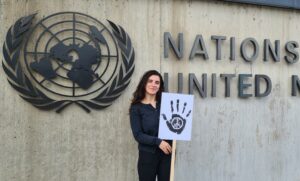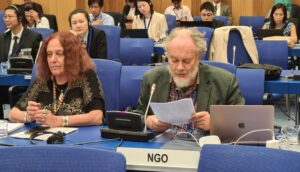Photo: Ambassador Jarmo Viinanen (Finland), Chair of the 2023 NPT Prep Com.
Amid heightened risks of nuclear war by crisis escalation, miscalculation, accident or intent, a growing number of States parties to the Nuclear Non-Proliferation Treaty (NPT) – including China and the New Agenda Coalition – have called on the nuclear-armed and allied states to relinquish current policy options to initiate/launch a nuclear war (first-use options) and instead affirm policies of no-first-use.
States Parties to the NPT – which includes five nuclear-armed states and thirty-four States reliant on extended nuclear deterrence, along with all non-nuclear States – met at the UN in Vienna from July 31 to August 11 to discuss a range of non-proliferation, risk reduction and disarmament issues and proposals.
The Chair of the NPT Prep Com, responding to the calls by governments and civil society for the adoption of no-first-use policies, included this in his draft factual summary of the NPT meeting.
Civil society calls at the 2023 NPT Prep Com for NoFirstUse policies
On August 1, NoFirstUse Global and the Abolition 2000 Working Group on Nuclear Risk Reduction organized a side event at the United Nations entitled Nuclear Risk Reduction – 90 seconds to Midnight.
Panelists discussed the calls made in the Declaration of Public Conscience Nuclear Taboo from Norm to Law and the more in-depth discussion and proposals in No-First Use of Nuclear Weapons: An Exploration of Unilateral, Bilateral and Plurilateral Approaches and their Security, Risk-reduction and Disarmament Implications, a working paper which NoFirstUse Global submitted last August to the 2022 NPT Review Conference.
On August 2, John Hallam, NoFirstUse Global Coordinating Committee Member, delivered a statement to the plenary meeting of the NPT, in which he highlighted the working paper on no-first-use and its key recommendations, and in which he formally presented the Nuclear Taboo from Norm to Law declaration to the NPT delegates.
The Declaration is endorsed by over 1100 ‘notables’ (former Prime Ministers, Foreign Ministers, Defence Ministers and legislators, academics, scientists, religious leaders, youth and representatives of civil society organizations). It calls upon the NPT Parties to affirm the G20 Bali Leaders statement that ‘The threat of use or use of nuclear weapons is inadmissible‘ and to ‘enshrine this stance as a dictate of international law and to require all member states to comply fully, in order to ensure their security policies and practices rule-out the initiation of nuclear war including any first-use of nuclear weapons.’
Governments promoting No-First-Use at the NPT
China submitted a working paper to the NPT Prep Com entitled Nuclear Risk Reduction in which it called on all nuclear-weapon States to “adopt responsible nuclear strategies including no-first-use of nuclear weapons policies,” and to “issue joint statements on mutual non-first-use of nuclear weapons and negotiate treaties on no first use of nuclear weapons.”
The New Agenda Coalition (Brazil, Egypt, Ireland, Mexico, New Zealand and South Africa), submitted a working paper to the NPT Prep Com entitled Taking forward nuclear disarmament which “fully supports the calls by the Secretary-General of the United Nations, in the context of the New Agenda for Peace, for, inter alia, the nuclear-weapon States to commit to the “no first use” of nuclear weapons as an interim step and to assure States that do not have such weapons that they will not use – or threaten to use – nuclear weapons against them, pending the ultimate elimination of nuclear weapons according to clear benchmarks and within an agreed time frame.“
Another like-minded group of 11 countries (Austria, Chile, Colombia, Costa Rica, Ecuador, Kiribati, Liechtenstein, Malta, Mexico, San Marino and Thailand) submitted a working paper entitled Measures to reduce the breadth of risks associated with nuclear weapons and measures to avoid increasing this risk which highlights the risks of “nuclear postures that assert the right to use nuclear weapons first (even in response to non-nuclear threats)” and calls for the “adoption, as an interim step on the path to nuclear zero, of no-first-use policies by the nuclear-armed States.”




